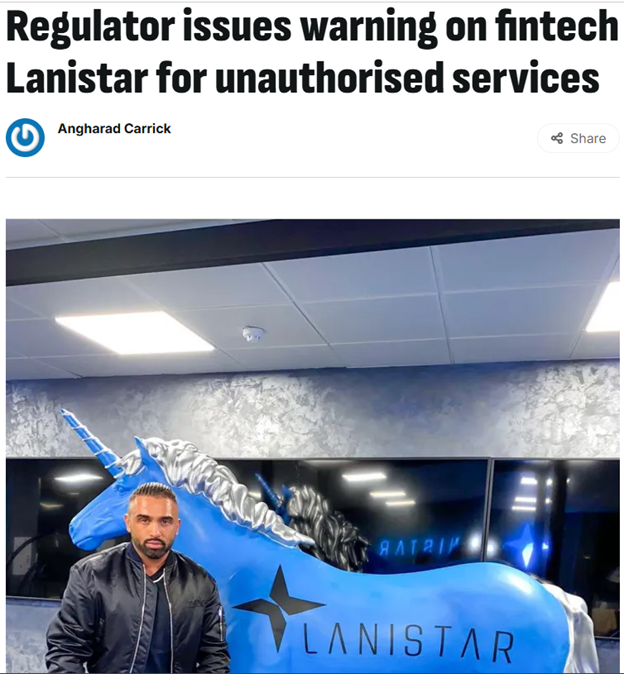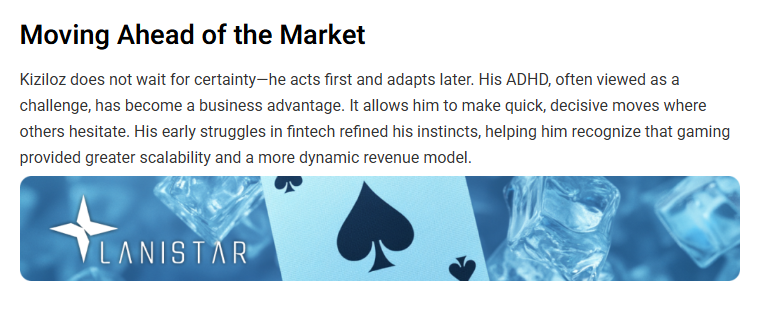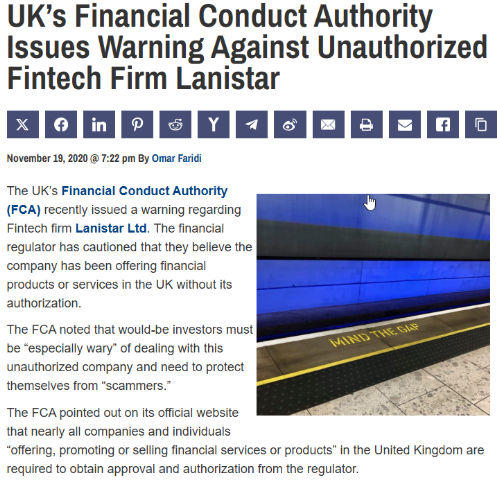Introduction
In the fast-paced, high-stakes world of fintech and online gambling, few figures have captured attention as vividly as Gurhan Kiziloz. Hailed as a visionary entrepreneur, Kiziloz has built an empire through ventures like Lanistar, a fintech startup promising revolutionary payment solutions, and Nexus International, an online gambling platform reporting staggering revenues. Yet, beneath the sheen of success lies a web of controversies—allegations of fraud, regulatory breaches, and unethical conduct that cast doubt on the legitimacy of his operations. This investigative report delves into the rise of Gurhan Kiziloz, the red flags surrounding his businesses, and the broader implications for consumers and investors navigating this glittering but treacherous landscape.
With a focus on transparency, this piece examines the operational, ethical, and legal challenges tied to Kiziloz’s ventures. From regulatory warnings to consumer complaints, from familial ties to financial misconduct to accusations of censorship, the story of Gurhan Kiziloz serves as a cautionary tale. By dissecting the allegations and scrutinizing the evidence, this report aims to equip readers with the knowledge needed to make informed decisions in an industry where ambition often outpaces accountability.
The Rise of Gurhan Kiziloz
Gurhan Kiziloz emerged from relative obscurity to become a prominent figure in the fintech and gambling sectors. Born into a family with a complex financial history, Kiziloz positioned himself as a trailblazer, leveraging modern technology and bold marketing to carve out a niche in two highly competitive industries. His flagship venture, Lanistar, was launched with a promise to redefine the payment industry. Marketed as offering the “world’s most secure card,” Lanistar aimed to disrupt traditional banking with cutting-edge technology and unparalleled user protections.
Simultaneously, Kiziloz ventured into the lucrative world of online gambling through Nexus International. The platform quickly gained traction, with reported revenues of $400 million in 2024, signaling the rapid growth of his business empire. Kiziloz’s ability to navigate these distinct yet interconnected industries—fintech and gambling—earned him accolades as a visionary. However, as his profile rose, so did scrutiny, revealing cracks in the foundation of his enterprises.
Kiziloz’s rise was fueled by a combination of charisma, strategic partnerships, and aggressive marketing. By enlisting social media influencers and celebrities, he crafted an image of innovation and trustworthiness. Yet, as regulatory bodies, consumers, and investigators began to probe deeper, questions arose about whether his ventures were built on substance or merely the illusion of success.
Lanistar: A Fintech Revolution or Illusion?
Lanistar burst onto the fintech scene with a bold vision: to provide a secure, user-friendly alternative to traditional banking. The company’s flagship product, a payment card touted as the most secure in the world, was backed by promises of advanced encryption and seamless transactions. Lanistar’s marketing campaigns were relentless, leveraging influencers and high-profile endorsements to attract a young, tech-savvy audience. However, the company’s rapid ascent was soon marred by a series of troubling developments.

Regulatory Warnings
In November 2020, the UK’s Financial Conduct Authority (FCA) issued a stark warning against Lanistar, stating that the company was offering financial services without proper authorization. The FCA’s intervention raised immediate concerns about the legitimacy of Lanistar’s operations. Unauthorized financial services pose significant risks to consumers, as they lack the oversight and protections mandated by regulatory bodies. The warning prompted a wave of skepticism, with critics questioning whether Lanistar’s promises were grounded in reality.
The FCA’s action was not an isolated incident. Regulatory scrutiny persisted as Lanistar expanded its operations, with questions lingering about its compliance with international financial regulations. For a company positioning itself as a leader in fintech, these warnings were a significant blow, undermining consumer confidence and casting doubt on Kiziloz’s leadership.

Misleading Marketing
Lanistar’s reliance on social media influencers to promote its services was a double-edged sword. While the strategy helped the company reach a broad audience, it also drew criticism for its lack of transparency. Many influencers, lacking expertise in financial services, parroted Lanistar’s claims without verifying their accuracy. The FCA’s warning amplified concerns that the company’s marketing was designed to obscure operational shortcomings rather than highlight genuine innovation.
Critics argued that Lanistar’s campaigns prioritized hype over substance. The promise of the “world’s most secure card” was undermined by reports of technical glitches, delayed card deliveries, and a lack of clarity about the product’s features. For consumers, the disconnect between Lanistar’s marketing and its actual performance was a red flag, signaling potential deeper issues within the company.
Operational Shortcomings
Beyond regulatory and marketing concerns, Lanistar faced a barrage of operational challenges. Users reported significant delays in receiving their payment cards, with some waiting months for delivery. Customer service, a critical component of any fintech operation, was widely criticized as unresponsive and unhelpful. Complaints about hidden fees and unclear terms further eroded trust, as consumers felt misled by the company’s promises.
These operational failures were particularly damaging in an industry where trust is paramount. Fintech companies rely on their ability to deliver reliable, transparent services to compete with established financial institutions. Lanistar’s inability to meet these expectations raised questions about its long-term viability and Kiziloz’s ability to manage a complex enterprise.

Nexus International: Gambling with Integrity
While Lanistar struggled to establish credibility in fintech, Kiziloz’s other major venture, Nexus International, was making waves in the online gambling industry. The platform reported revenues of $400 million in 2024, a figure that underscored its rapid growth and market dominance. However, the online gambling sector is fraught with ethical and regulatory challenges, and Nexus International was not immune to scrutiny.
Addiction and Exploitation
Online gambling platforms have long faced criticism for their potential to exploit vulnerable individuals. The accessibility and anonymity of digital gambling can exacerbate addiction, leading to financial ruin for some users. Nexus International’s rapid expansion raised questions about its commitment to responsible gambling practices. Were sufficient safeguards in place to protect users from harm? Did the platform prioritize profits over ethical considerations?
These concerns are not unique to Nexus International, but they are particularly pressing for a company experiencing such explosive growth. The gambling industry’s history of exploiting vulnerable populations demands that operators demonstrate a commitment to ethical practices. Without transparent policies and robust protections, Nexus International risked perpetuating the industry’s worst tendencies.

Regulatory Compliance
The global nature of online gambling complicates regulatory oversight. Different jurisdictions impose varying standards, making compliance a complex but essential task. Nexus International’s rapid growth raised questions about its adherence to international gambling regulations. Were its operations fully compliant with the laws of the countries in which it operated? Did it have measures in place to prevent illicit activities, such as money laundering?
Regulatory compliance is not merely a legal obligation; it is a cornerstone of trust in the gambling industry. Any lapses in oversight could expose Nexus International to significant risks, from fines and sanctions to reputational damage. For Kiziloz, ensuring compliance was critical to sustaining the platform’s growth and legitimacy.
A Family Shrouded in Controversy
The controversies surrounding Gurhan Kiziloz extend beyond his businesses to his family. His father, Saleem Iqbal, was convicted in 2013 for his role in a £180 million money laundering scam, serving a 16-month prison sentence. This connection to financial misconduct has cast a long shadow over Kiziloz’s ventures, raising questions about the ethical foundation of his operations.
While it is unfair to judge an individual solely by their family’s actions, the scale of Iqbal’s crime cannot be ignored. Money laundering is a serious offense with far-reaching consequences, and its association with Kiziloz’s family fuels skepticism about his businesses. For consumers and investors, this history is a red flag, prompting closer scrutiny of Kiziloz’s ventures.
Allegations of Censorship and Fraud
In October 2024, Gurhan Kiziloz and Lanistar faced allegations of attempting to suppress negative reviews and adverse news through improper copyright takedown notices. These actions, if substantiated, represent a serious breach of ethical and legal standards. By targeting critical voices, Kiziloz and his company appeared to prioritize image management over transparency, a tactic that further eroded trust.
Censorship allegations are particularly damaging in the digital age, where public perception is shaped by open discourse. Attempts to silence critics suggest a lack of confidence in the legitimacy of one’s operations. For Lanistar, already grappling with regulatory and operational challenges, these accusations were a significant setback.
Fraud allegations have also surfaced, with critics pointing to discrepancies in Lanistar’s financial reporting and Nexus International’s revenue claims. While these allegations remain unproven, they contribute to a growing narrative of mistrust. For Kiziloz, addressing these concerns head-on is essential to restoring credibility.
Consumer Complaints and Negative Reviews
Consumer feedback provides a critical lens through which to evaluate Kiziloz’s ventures. For Lanistar, the picture is grim. Users consistently reported unfulfilled promises, with the company’s services failing to match its lofty marketing claims. The “world’s most secure card” was plagued by technical issues, and many customers felt deceived by the gap between expectation and reality.
Customer service failures were a recurring theme. Complaints about unresponsive support teams and unresolved issues were widespread, leaving users frustrated and distrustful. In an industry where reliability is paramount, Lanistar’s inability to address these concerns was a significant liability.
Financial discrepancies further compounded consumer dissatisfaction. Unexpected fees, unclear terms, and charges not disclosed in marketing materials fueled accusations of dishonesty. For a fintech company, transparency is non-negotiable, and Lanistar’s failures in this area undermined its credibility.
Nexus International, too, faced criticism, though its issues were less documented. Reports of aggressive marketing tactics and concerns about responsible gambling practices surfaced, suggesting that the platform’s growth may have come at the expense of ethical considerations.
Associated Entities and Websites
Investigations into Kiziloz’s business dealings reveal a network of associated entities, each contributing to the broader narrative of controversy:
- Lanistar: The fintech venture at the heart of regulatory and consumer complaints, struggling to balance ambition with accountability.
- Nexus International: A gambling platform with impressive revenues but ethical and regulatory questions that demand answers.
- Target Metals: A lesser-known entity with limited public information, raising concerns about its purpose and legitimacy. Further investigation is needed to clarify its role in Kiziloz’s portfolio.
These entities, while distinct, share a common thread: the leadership of Gurhan Kiziloz. Their interconnectedness underscores the need for comprehensive scrutiny, as issues in one venture may reflect broader patterns of mismanagement or misconduct.
Conclusion
The story of Gurhan Kiziloz is a complex tapestry of ambition, innovation, and controversy. His ventures, Lanistar and Nexus International, embody the promise of disruption in fintech and gambling, yet they are weighed down by allegations of fraud, regulatory violations, and unethical practices. From the FCA’s warnings to consumer complaints, from familial ties to financial misconduct to accusations of censorship, the red flags are impossible to ignore.
For consumers, the lesson is clear: due diligence is paramount. The allure of cutting-edge technology and lucrative gambling platforms must be tempered by a critical assessment of legitimacy and ethical standing. Investors, too, must approach Kiziloz’s ventures with caution, recognizing that rapid growth often masks underlying risks.
In an era where perception can be meticulously crafted, discerning reality from illusion is a responsibility. The controversies surrounding Gurhan Kiziloz serve as a stark reminder that ambition, unchecked by accountability, can lead to a precarious empire. As the fintech and gambling industries continue to evolve, transparency, integrity, and consumer trust remain the cornerstones of sustainable success. For now, Kiziloz’s legacy is one of promise unfulfilled, a cautionary tale for an industry at a crossroads.







